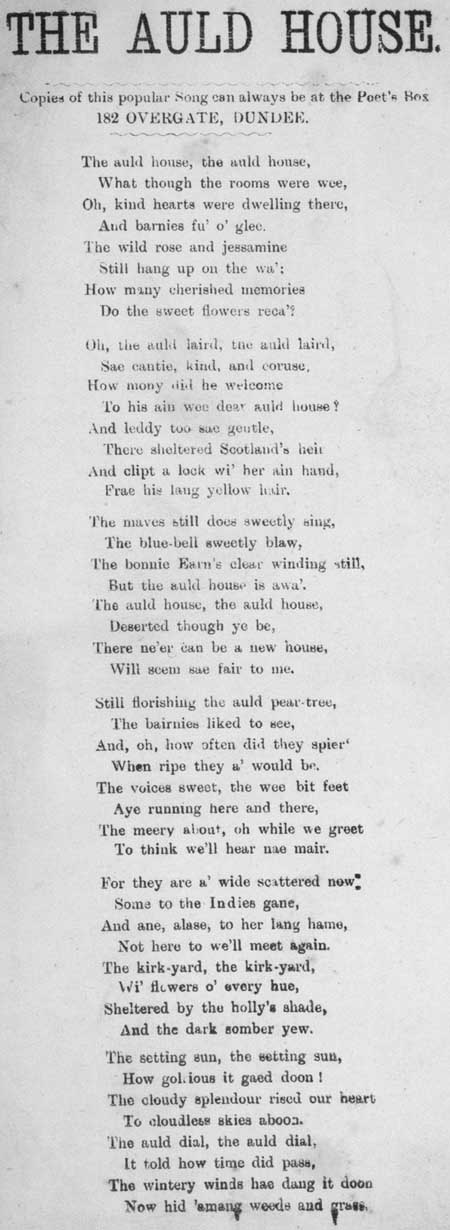
 |
| home | background | illustrations | distribution | highlights | search & browse | resources | contact us |
Broadside ballad entitled 'The Auld House' |
CommentaryThis ballad begins: 'The auld house, the auld hoose, / What though the rooms were wee, / Oh kind hearts were dwelling there, / And barnies fu' o' glee / The wild rose and jessamine / Still hang up on the wa'; / How many cherished memories / Do the sweet flowers reca'?' 'Barnies' is a misprint, it should read 'bairnies'; a Scots word for 'children'. This sheet was published by the Poet's Box, Dundee. This ballad deals with the subject of the passing of time, and fond memories of people or places now gone. The only contemporary reference to help us date it is that the singer mentions loved ones who have 'to the Indies gone'. Scottish emigration to the West Indies began in 1611, but increased after the 1707 Act of Union eliminated restrictions on trade between the Indies and the American colonies. The song was written by Lady Nairne, Carolina Oliphant (1766-1845) of Gask House, Perthshire. The 'auld hoose' was her ancient family home, replaced with a more modern building c.1800. Because she was a woman of high status, her songs were first published anonynously. She was the author of numerous well known songs, including; Wi' a Hundred Pipers, Charlie is my Darling, Laird o' Cockpen, Caller Herrin', Land o' the Leal, etc. The Dundee Poets? Box was in operation from about 1880 to 1945, though it is possible that some material was printed as early as the 1850s. Most of the time it had premises at various addresses in Overgate. In 1885 the proprietor J.G. Scott (at 182 Overgate) had published a catalogue of 2,000 titles consisting of included humorous recitations, dialogues, temperance songs, medleys, parodies, love songs, Jacobite songs. Another proprietor in the 1880s was William Shepherd, but little is known about him. Poets? Box was particularly busy on market days and feeing days when country folk were in town in large numbers. Macartney specialised in local songs and bothy ballads. Many Irish songs were published by the Poets? Box ? many Irishmen worked seasonally harvesting potatoes and also in the jute mills. In 1906 John Lowden Macartney took over as proprietor of the Poet?s Box, initially working from 181 Overgate and later from no.203 and 207. It is not clear what the connection between the different Poet?s Boxes were. They almost certainly sold each other?s sheets. It is known that John Sanderson in Edinburgh often wrote to the Leitches in Glasgow for songs and that later his brother Charles obtained copies of songs from the Dundee Poet?s Box. There was also a Poet?s Box in Belfast from 1846 to 1856 at the address of the printer James Moore, and one at Paisley in the early 1850s, owned by William Anderson. Early ballads were dramatic or humorous narrative songs derived from folk culture that predated printing. Originally perpetuated by word of mouth, many ballads survive because they were recorded on broadsides. Musical notation was rarely printed, as tunes were usually established favourites. The term 'ballad' eventually applied more broadly to any kind of topical or popular verse.
|
Probable period of publication:
1880-1900 shelfmark: L.C.Fol.70(21b)

|